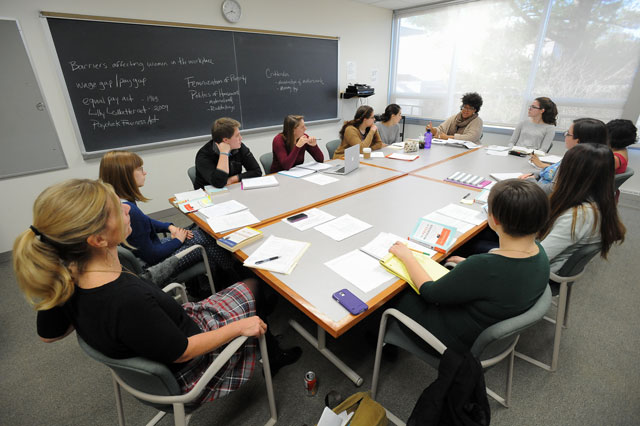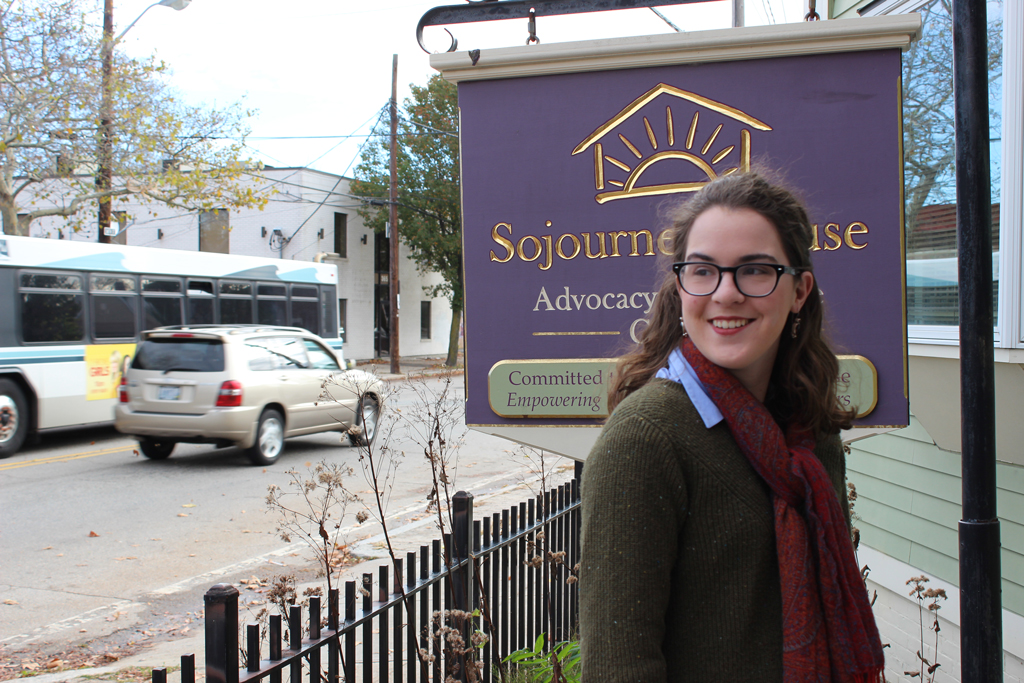Writing with purpose

When designing her Senior Seminar for women’s and gender studies majors about five years ago, Associate Professor Kim Miller wanted to offer something new.
“By the time students reach the Senior Seminar, they have already had substantial experience conducting research, reading and writing,” Miller said. “Because of this, one focus of the Senior Seminar—and one that makes us unique—is to equip students with practical skills that are associated with engaging in feminist politics, and which will help them find success in the complex contexts in which they will live and work.”
Over the years, students in the class have written grant proposals for five Providence, R.I.-based nonprofit organizations—the Rhode Island National Organization of Women, Women’s Fund of Rhode Island, Girls Rock Rhode Island, Lady Project and Sojourner House. One proposal helped Girls Rock get more instruments for the young musicians the organization fosters. Others have been adapted by the organizations to meet a variety of needs.
Early in the semester, former Women’s Fund CEO Marcia Coné comes to Miller’s class to run a workshop on grant writing for nonprofit organizations. Coné has repeated the training each year.
The students also visit the nonprofit site in the second week to better understand how the organization works.
This fall, the students are working with Sojourner House, which provides shelter, advocacy and other resources for victims of domestic violence. Working in two teams, the students are writing grant proposals to support the organization’s immigration advocacy program and youth arts groups.
“This activity provides a great opportunity for students to gain firsthand experience about what it’s like to think about supporting a nonprofit program, creating a budget and making the case to a funding source,” said Vanessa Volz, executive director of Sojourner House. (Vole has also taught women’s studies at Wheaton as a visiting professor.)
Along with professional training, the project helps students grow their resumes.
“I’ve had a number of students who have graduated tell me that it’s helped them in law school or it helped them get a job. Employers look at their resumes and they’re surprised to see they have that training,” Miller said.
The class has also helped undergraduates.
Alex Natale ’16, a double major in women’s and gender studies and film and new media studies, took the class as an underclassman and is taking it again this fall.
“I wrote a grant when I took this course before, and having that on my resume made me a really competitive candidate for internships,” she said.
Emily Mercurio ’16, a double major in English and women’s and gender studies, found the project both challenging and beneficial.
“Grant writing requires open lines of communication with the nonprofit, significant research and off-campus travel, all of which can be hard to work into an already packed senior schedule,” she said. “At the same time, part of professional life is being able to manage having lots of irons in the fire at once, and I’m grateful for the practice run.”
For Emily Bergmann ’16, the class offers the perfect blend of theory and practice and a chance to spend time with other women’s and gender studies majors. She is also a double major, studying film and new media as well and is interning this fall at Sojourner House.
“I’m using all of the academic skills I’ve honed over the past four years on the readings, and I’m working on writing and more professional skills through the grant-writing process,” Bergmann said. “The Senior Seminar is unique because we work on a real grant proposal, not just some trial document that gets graded and then forgotten.”
Many women’s and gender studies graduates go on to work in the nonprofit sector, Miller said, doing the very work they support in the Senior Seminar.
“I have a number of students who do some kind of work related to domestic violence—policy work or working in a shelter or as a therapist. I have a student who just passed the bar exam and is going into some kind of law that will be influenced by her major,” Miller said. “I do think it channels them into a particular kind of work that maybe other people just don’t do and that’s really needed.”

